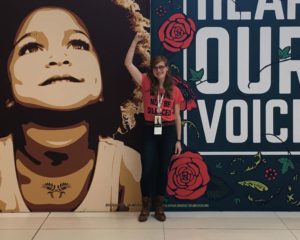
While the Ford School of Public Policy offers a rigorous curriculum, they also recognize that not all learning takes place in the classroom. For that reason, they offer $500 in professional development funding per year to each graduate student. This year, I used a portion of my professional development funding to attend The Women’s Convention in Detroit, Michigan from October 27th to 29th.
Founded by the organizers of the Women’s March, the Women’s Convention brought together activists, politicians, and women* for a weekend of learning, movement building, and artistic expression. When I arrived on Friday morning, I was overwhelmed by the palpable energy of the more than 4,000 conference attendees. The main hall was filled with thousands of people from across the U.S. and Puerto Rico that had come together with a shared intention to “reclaim our time” through resistance and action.
As a straight, cis-gender, white woman, I was thrilled to see diversity in race, age, gender, and ability represented in the attendees, panelists, and keynote speakers. It was clear that the organizers had prioritized intersectionality—the belief that we all have overlapping identities that affect our life experience. The focus on intersectionality gave attendees an avenue to better understand other’s experience of power and oppression and how they could use their privilege to fight for equality for all women.
The highlight of the conference was the keynote speech by Congresswoman Maxine Waters (D-California) on Saturday. A tireless advocate for women, children, and people of color, Congresswoman Waters focused her speech on sexual assault and harassment, centering on the recent #metoo movement. She spoke about the cost of silence, saying “We cannot afford to be shut down or shut up by any man.” I was struck by her passionate rallying cry to “keep up the resistance” and “provide the leadership” for the progressive movement. Throughout her speech, she received several standing ovations and she ended her talk by leading a chant to “Impeach 45.”
The conference offered a multitude of panels on topics including community organizing and advocacy, public speaking, equitable labor policies, incarceration, and much more. Here is a brief overview of a few of the panels I attended:
- Future(s) of Work—what the growth of the food and domestic industry means for women and economic security
- Leverage Local Power: Winning on the Inside—lobbying and grassroots strategies to affect change
- This is What Democracy Looks Like! Engaging New Voters in 2018—voter engagement and the changing demographics of the Democratic party
Through these workshops, I learned organizing tactics and strategies to build power in my local community and I gained a better understanding of the challenges to creating transformational change. I was also inspired to run for political office, and I hope to one day run for city council or as a state representative. I am grateful to the Ford School for providing me with the opportunity to hear from the women that are changing our nation for the better!
The word “women” refers to significantly female-identified people, including trans women, genderqueer women, and non-binary people.
